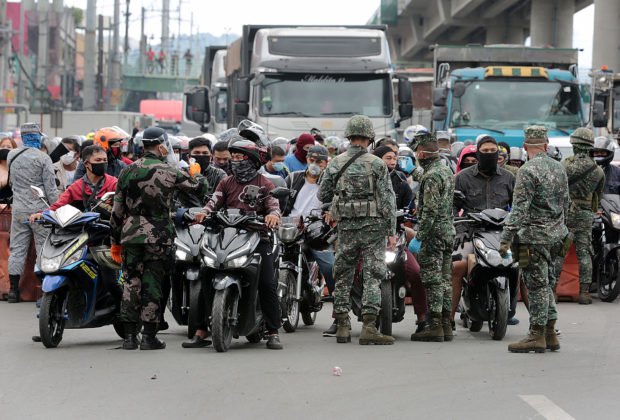Government in no rush to end Luzon lockdown

WAIT AND SEE More days like this? The Luzon lockdown as enforced in Marikina City on March 17. (Photo by GRIG C. MONTEGRANDE / Philippine Daily Inquirer)
MANILA, Philippines — The Luzon-wide enhanced community quarantine set to end on April 12 may have to be extended for 15 to 20 more days to sustain its gains, the head of the national task force (NTF) against the new coronavirus disease (COVID-19) said on Saturday.
Task force chief Carlito Galvez Jr., who is also the presidential peace adviser, said the timing of the lifting of the quarantine was being discussed with the Inter-Agency Task Force on Emerging Infectious Diseases (IATF-EID), which makes the policies to be implemented by the NTF during the national health emergency.
“It’s quite difficult to rush to normalcy and the problem comes back. What we are considering is to impose this in one go, perhaps extend it for another 15 or maybe 20 more days so we can sustain its positive impact,” he said in a radio interview.
An ill-timed termination of the quarantine period may spoil the government’s goal of “flattening the curve,” or controlling the contagion, Galvez said.
The DOH reported that 3,094 people had been afflicted with COVID-19, including 144 who had died and 57 who had recovered as of Saturday.
“It will be premature if we make the announcement at this time. We cannot preempt the decision of the President,” Galvez said.
Partial or total lifting?
Takeshi Kasai, Western Pacific regional director for the World Health Organization had also cautioned against rushing to end the quarantine and halt other public health regulations against COVID-19.
“We may have to peel one by one and not just immediately lift those public health measures which were bundled with the lockdown to balance and control the disease and to bring society back to normal,” he said.
Some lawmakers and business groups have called for an extension or gradual lifting of the restrictions.
Cabinet Secretary Karlo Nograles, the IATF-EID spokesperson, said it had approved the parameters proposed by a subtechnical working group for deciding whether to totally or partially lift or extend the Luzon lockdown.
The parameters include the trends in the growth or deceleration in the number of COVID-19 cases in the country, said Nograles.
Capacity assessment
Also to be considered are the capacity of the country’s health care system, including the number and availability of quarantine, isolation, and treatment facilities; the capability to mount contact tracing; the availability of personal protective equipment for front-line workers; and the country’s testing capacity.
Various social, economic and security factors will also be weighed, Nograles said.
He said the Department of Health (DOH) was directed to “convene all concerned agencies and to finalize the aggregation and analysis of all relevant data” which would be discussed by the IATF-EID before President Duterte makes the “final determination” of what to do.
Nograles said experts, including scientists, doctors, and members of the academe, would analyze data in coming up with recommendations about the quarantine.
China experts arriving
Nograles also said the IATF-EID had authorized the visit of a 12-member team of Chinese health experts to help the government deal with the COVID-19 outbreak in the Philippines.
The SARS-CoV-2, the virus that causes the acute respiratory ailment, originated in Wuhan City, capital of central China’s Hubei province.
Health Undersecretary Maria Rosario Vergeire said the team was expected to arrive on Sunday. The group of doctors and nurses will stay for two weeks to “observe and give recommendations” on such areas as infection prevention and control, critical care and laboratory management, she said.
The Chinese Embassy in Manila said the delegation would be led by Director-General Zheng Huiwen and include physicians from the First Affiliated Hospital of Fujian Medical University, Fujian Provincial Hospital, Fujian University of Traditional Chinese Medicine, and Fujian Provincial Center for Disease Control and Prevention.
Their expertise covers critical care medicine, infectious disease control, internal medicine and clinical integration of traditional Chinese and Western medicine.
Lab visits
Vergeire said the group would visit the Research Institute for Tropical Medicine in Muntinlupa City, San Lazaro Hospital in Manila and the Lung Center of the Philippines in Quezon City.
These serve as laboratories for testing COVID-19 and also taking care of patients who have contracted SARS-CoV-2.
Vergeire earlier said the DOH had requested a visit by a group of Chinese experts “because we wanted to learn and be advised on our measures against COVID-19.”
“We want them to share their expertise because we saw that they have lessened their number of cases and deaths,” she said.
—WITH A REPORT FROM INQUIRER RESEARCH
For more news about the novel coronavirus click here.
What you need to know about Coronavirus.
For more information on COVID-19, call the DOH Hotline: (02) 86517800 local 1149/1150.
Disclaimer: The comments uploaded on this site do not necessarily represent or reflect the views of management and owner of Cebudailynews. We reserve the right to exclude comments that we deem to be inconsistent with our editorial standards.

